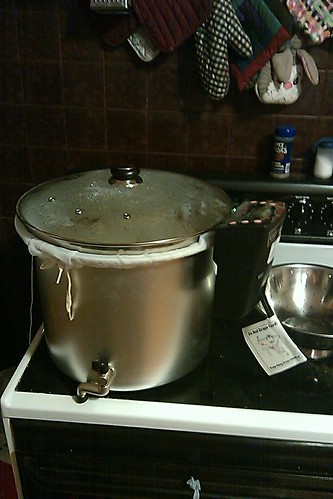I brewed my first BIAB yesterday. Recipe instructions stated:
11lbs grain
mash @ 152 for 60 min
1lb/1.5qt (mash)
1lb/2qt (sparge)
I BIABed it at:
(5.5g final volume) + (1g boil off) + (1g grain absorbtion) = 7.5 mash volume
11lbs grain
mash @ 152 for 60 min
1lb/2.72qt
I ran my crushed grains through a blender for a 2 second pulse per cup, hit my strike temp dead on, mashed out at 170 for 10 minutes. Hit all my pre/post volumes, pre-boil OG 1.044, and my final OG was 1.053 (recipe was 1.052-1.056). Calculated Brewhouse effeciency was 70%
Heres the question. After researching grain/water ratios, apparently a thick mash yeilds a malty, less fermentable wort. A thin mash yields a low body, high fermentable wort. Given that most BIAB no-sparge brewers mash in the 1lb/2.5qt range, is there a noticiable difference in the beers? Any side-by-side comparisons?
Heres my fix...
BIAB mash at 1lb/1.5qt(4.125g) at 152 for 60min. Add the remaining 3.375 gallons, raise to 170, and mash out for 10 minutes. Pull the bag leaving 6.5 pre-boil?
Does this sound resonable? Has anyone done this and tested the results?
EDIT: I am aware of BIAB sparging in a second pot, but I'm sticking with the 1 pot method.
11lbs grain
mash @ 152 for 60 min
1lb/1.5qt (mash)
1lb/2qt (sparge)
I BIABed it at:
(5.5g final volume) + (1g boil off) + (1g grain absorbtion) = 7.5 mash volume
11lbs grain
mash @ 152 for 60 min
1lb/2.72qt
I ran my crushed grains through a blender for a 2 second pulse per cup, hit my strike temp dead on, mashed out at 170 for 10 minutes. Hit all my pre/post volumes, pre-boil OG 1.044, and my final OG was 1.053 (recipe was 1.052-1.056). Calculated Brewhouse effeciency was 70%
Heres the question. After researching grain/water ratios, apparently a thick mash yeilds a malty, less fermentable wort. A thin mash yields a low body, high fermentable wort. Given that most BIAB no-sparge brewers mash in the 1lb/2.5qt range, is there a noticiable difference in the beers? Any side-by-side comparisons?
Heres my fix...
BIAB mash at 1lb/1.5qt(4.125g) at 152 for 60min. Add the remaining 3.375 gallons, raise to 170, and mash out for 10 minutes. Pull the bag leaving 6.5 pre-boil?
Does this sound resonable? Has anyone done this and tested the results?
EDIT: I am aware of BIAB sparging in a second pot, but I'm sticking with the 1 pot method.




